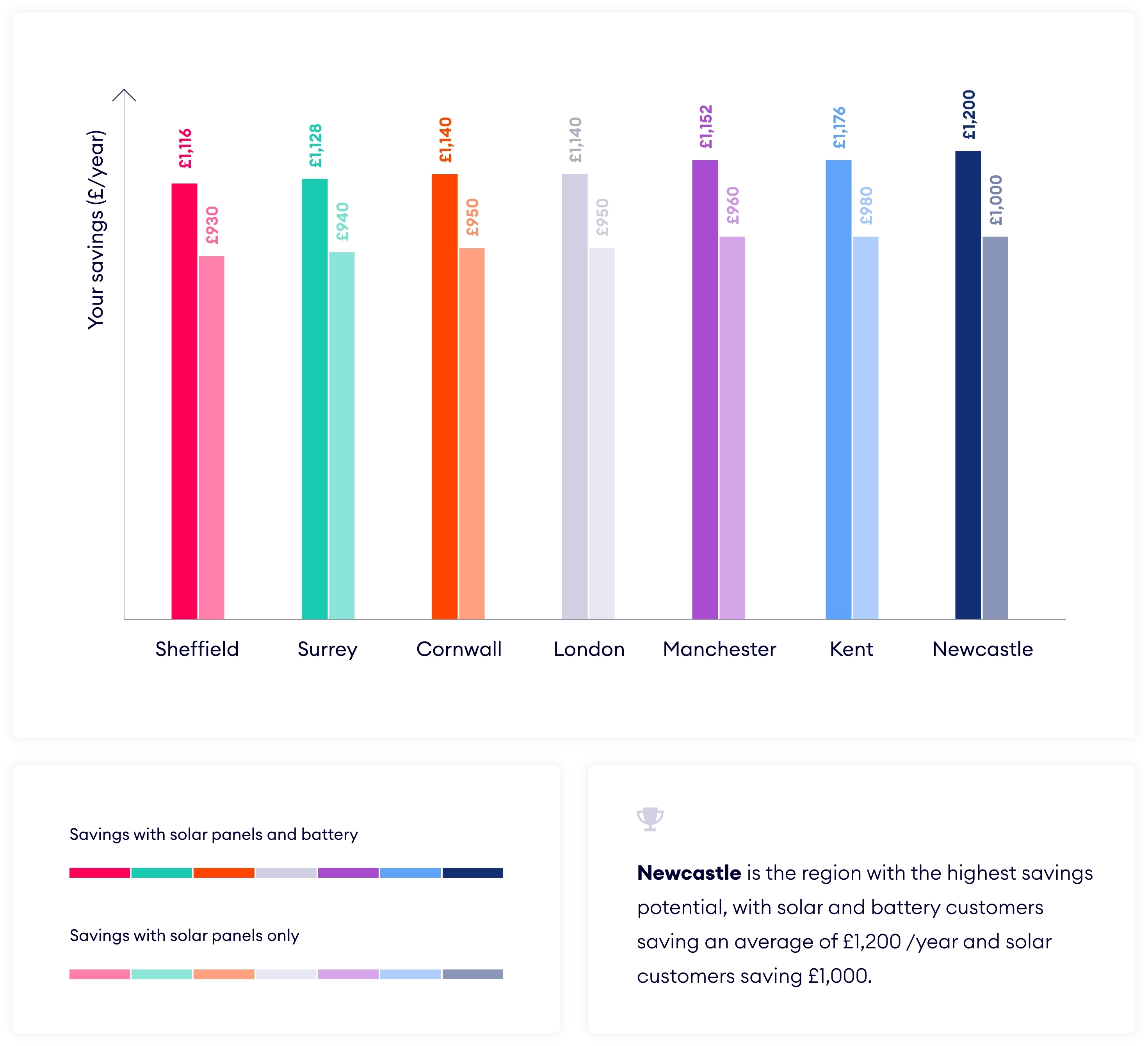Business? Add your company to SpotDif today.
How solar panels can save you money
We recognise that solar panels involve a significant upfront cost. However, they can also offer a huge return on your investment in several key ways. Let’s take a look at how solar panels can save you money in the long run and how these savings may vary depending on your unique circumstances
Property Location
Share your address so our AI Deal Detectives can compare your local installers
Financial savings after installation
According to MoneySavingExpert, an average household with a 3.5 kilowatt-peak system can save between £135 and £360 on their energy bills each year.
This means most UK households with solar panels will break even on their investment in about 14 and a half years. This might seem lengthy, but when you consider how solar panels can also add 25% to your property value, the scales tip further in favour of the investment.
Of course, the exact energy bill savings you can expect depend on your property and the number of solar panels, your household’s energy consumption, and whether or not you have a solar panel battery. Your location will also have an effect, as some parts of the UK benefit from more direct sunlight than others.
As an example, if you live in London, you could save between £150 and £360 on your annual energy bills — or even more if you make use of the SEG, as we’ll go on to explain.
Solar panel energy savings by area in the UK

-2.webp)
How long will it take to break even?
Energy Prices | Electricity Bill Savings | SEG Payment | Cost of System | Years to Break Even |
|---|---|---|---|---|
Savings based on April price cap | Average: £235 | Average: £273 | £7,000 | 14 Years |
Selling energy back to the grid
Did you know you can shorten that payback period by selling energy back to the National Grid, too? Through the Smart Export Guarantee (SEG), you can sell surplus energy produced by your solar panels. This process allows many households to break even on their solar panels in around 12 years.
Let’s look at some figures. According to the Energy Savings Trust, a household in London could save up to £630 per year by making the most of the Smart Export Guarantee. Meanwhile, homeowners in Aberystwyth, in west Wales could save up to £580, and those in Manchester could see savings of up to £565.
Property Location
Share your address so our AI Deal Detectives can compare your local installers
Grants and financial options
The Smart Export Guarantee is just one of several grants available to help more households embrace solar energy. We recommend having a look at our Guide to Solar Panel Grants for more in-depth information, but here’s an overview of a couple of the best options available.
ECO4
The Energy Company Obligation Scheme is in its fourth phase and offers low-income households financial support to help cover the cost of solar panel installations. Eligible households in England, Wales, and Scotland can get the cost of their solar panels fully or partially covered.
This scheme is set to run until the end of March 2026 — learn more on our ECO4 page or check your eligibility through Ofgem
0% VAT
Under the Value Added Tax (Installation of Energy-Saving Materials) Order 2024, households — and some charitable businesses — won’t need to pay VAT on solar panel installation. This tax relief came into play in February 2024 and is set to run until the end of March 2027.
From April 2027, VAT will be reinstated, but at 5%, a lower rate than before.
Saving solar power for dark winter days
We’ve looked at how you can earn money by selling your solar energy back to the National Grid, but that’s not your only option. With a solar panel battery, you can also save it for a rainy day — quite literally.
Contrary to popular belief, you don’t need direct sunlight to power solar panels — ambient light is plenty. In fact, solar panels are, on average, 15-20% efficient in the UK, which is the same as hotter countries around the world. Bear in mind that, as we mentioned above, some areas in the UK do get more sunlight than others.
However, as you can imagine, longer daylight hours and higher levels of sunshine mean most UK properties harness more solar energy in spring and summer. Despite this, solar panels can still cover up to 51% of your home’s energy usage in the winter.
With a solar panel battery, you can store any excess energy generated in the summer to power your home even more in the winter months.



